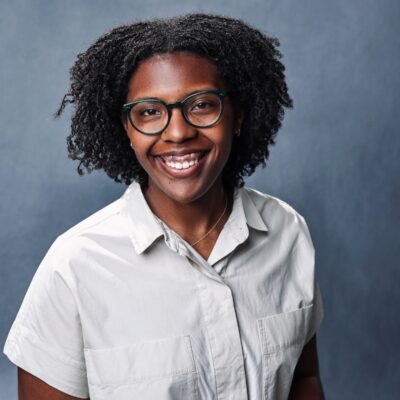Student Spotlight: Caylyn Railey

March 24, 2025
Caylyn Railey is a doctoral candidate in plant biology from Louisville, Kentucky. She earned her B.S. in biology with an emphasis in genetics, genomics, and bioinformatics with a minor in clarinet music performance at the University of Kentucky and now works at the intersection of functional genomics and RNA biology under the guidance of Andrew Nelson at Cornell.
What is your area of research and why is it important?
My work lies at the intersection of functional genomics and RNA biology. I am bridging bioinformatics with traditional molecular biology approaches to understand how long non-coding RNAs (lncRNAs) fit within transcriptional landscapes that govern plant development and stress response. Traditional sequencing approaches were limiting, only allowing researchers to capture the most highly expressed genes, thus leaving a large gap in our knowledge on how/what genes actually orchestrate (in) plant development and resilience. I am taking advantage of recent advancements in sequencing technology to comprehensively capture all genes expressed, which in turn facilitates a much more accurate investigation into plant genomics and transcriptomics.
What are the larger implications of this research?
lncRNAs have flown under the radar for some quite some time. Within the last few decades, lncRNAs have really filled a space in our understanding of how developmental and stress response programs are designed and executed. In plants, discerning these processes and how lncRNAs fit into these processes is crucial for our understanding of how plants ensure survival in the face of external adversity. Moreover, these offer entry points for engineering more resilient and efficient crops.
You shared your work in a recent student seminar. What did you learn about presenting your work through the process?
Presenting my work during student seminars always feels rewarding. It is an opportunity to show myself all that I have accomplished in the last year and to invite nuanced perspectives or interpretations of my research. The process of developing and delivering a presentation taught me one thing—less is more. Preparing my seminar encourages me to simplify my slides and lean into communicating the crux, rather than lingering on the minutiae. This has helped me realize how much I genuinely love experimenting with new ways to graphically interpret data in concise and aesthetic ways.
Can you share your experiences and takeaways from undertaking an internship in industry?
I spent a summer working at a start-up company in Boston that focuses on developing small molecule therapeutics. As a computational biology intern, I designed and implemented workflows for correlating lncRNA expression profiles with patient biomarker data. I had the opportunity to apply some of the skills I have developed as a graduate student (i.e. cloud computing, code development, and data visualization). Although I am currently working in plant systems, this experience highlighted how transferable my research and skills are to other systems. Notably, that summer emphasized how much I value collaborative workspaces that inspire self-directed research and creative freedom.
What are your hobbies or interests outside of your research or scholarship?
I enjoy movement of any kind! In the warmer months I really enjoy cycling. But, I run and weightlift to move through the winter months. Currently, I am interested in documenting my time as a graduate student, so I am dabbling in film photography to capture the moments that characterize my days. There is a mighty film photography community here and it’s always a great time to connect and create in the dark room. When I am not snapping or developing photos, I am either reading a soul-crushing contemporary fiction novel or crafting a playlist.
Why did you choose Cornell to pursue your degree?
I thought Cornell’s extensive and rooted plant biology program would allow me to fully foster my curiosity about the natural world and botany. Additionally, I believed Ithaca would be the perfect place to complete my graduate studies, as the abundance of nature would offer a grounding reprieve from my studies. Finally, the breadth of degree programs offered here also made me excited to connect with people across a variety of disciplines! I’m hoping to not only cultivate the parts of me that identify as a plant scientist but also nurture the community member and activist within.
